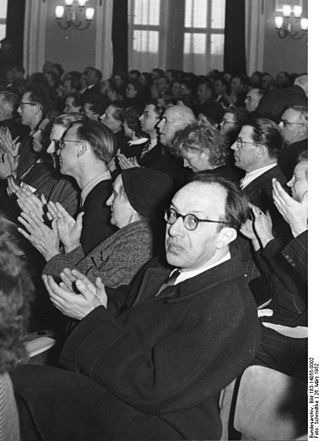Related Research Articles
Clytus Gottwald was a German composer, conductor, and musicologist who focused on choral music. He was considered by music critics to be a key figure in contemporary choral music, and is known for his arrangements for vocal ensembles of up to 16 voices. He founded and conducted the Schola Cantorum Stuttgart for this music.

Franz Schubert (1797–1828): New Edition of the Complete Works, commonly known as the New Schubert Edition (NSE), or, in German: Neue Schubert-Ausgabe (NSA), is a complete edition of Franz Schubert's works, which started in 1956 and is scheduled to conclude in 2027. The projected number of volumes of the publication, which includes score editions, critical reports and supplements, is 177, of which, as of 2020, 150 have been realised.
Hans Adolf Karl Wilhelm Grischkat was a German conductor, especially a choral conductor, also a church musician and academic teacher. He founded the choir Schwäbischer Singkreis for pioneering concerts and recordings of works by Bach and Monteverdi in the spirit of historically informed performance. He was the church musician of the Christuskirche in Reutlingen, published Bach cantatas for Hänssler, and was from 1950 a professor of choral conducting at the Musikhochschule Stuttgart.
Axel Beer is a German musicologist. He has been teaching at the Johannes Gutenberg University Mainz since 1995.
Johann Samuel Welter was a German composer.

Roswitha Trexler is a German operatic soprano and mezzo-soprano who became internationally known especially as an interpreter of the music of Hans Eisler and for her commitment to avantgarde vocal music.
Giselher Schubert is a German musicologist
Helmut Loos is a German musicologist and emeritus scholar.
Gösta Neuwirth is an Austrian musicologist, composer and academic teacher. He studied in Vienna and Berlin, where he wrote a dissertation on harmony in Franz Schreker's Der ferne Klang. He has taught at universities and music schools including the Musikhochschule Graz, University of Graz, Universität der Künste Berlin and University of Freiburg. His compositions include a string quartet and a chamber opera.
Hanns-Werner Heister is a German musicologist.
Matthias Herrmann is a German musicologist and university professor.
Friedhelm Krummacher is a German musicologist.
Gerd Rienäcker was a German musicologist.

Georg Knepler was an Austrian pianist, conductor and musicologist.
Wulf Konold was a German musicologist, dramaturge and theatre director.
Heinrich Lindlar was a German musicologist and music educator.
Daniela Philippi is a German musicologist with a research focus on Christoph Willibald Gluck, Antonín Dvořák and Czech music history and music of the 20th century.
Arnfried Edler is a German musicologist and university faculty in Kiel and Hanover.
Gustav Fock was a German music historian, editor early music and organologist. He is considered the most important Schnitger researcher of his time.
Arnold Feil was a German musicologist and academic scholar.
References
- ↑ Sándor Veress und das Exil : von der "Transsylvanischen Kantate" (1936) zur "Elegie" (1964) on WorldCat
- ↑ page Sándor Veress. Komponist – Lehrer – ForscherBärenreiter, on WorldCat
- ↑ Sándor Veress : Festschrift zum 80. Geburtstag on WorldCat
- ↑ Sándor Veress. Aufsätze, Vorträge, Briefe on WorldCat
- ↑ Weltliche Gesänge und Ritterspiel on WorldCat